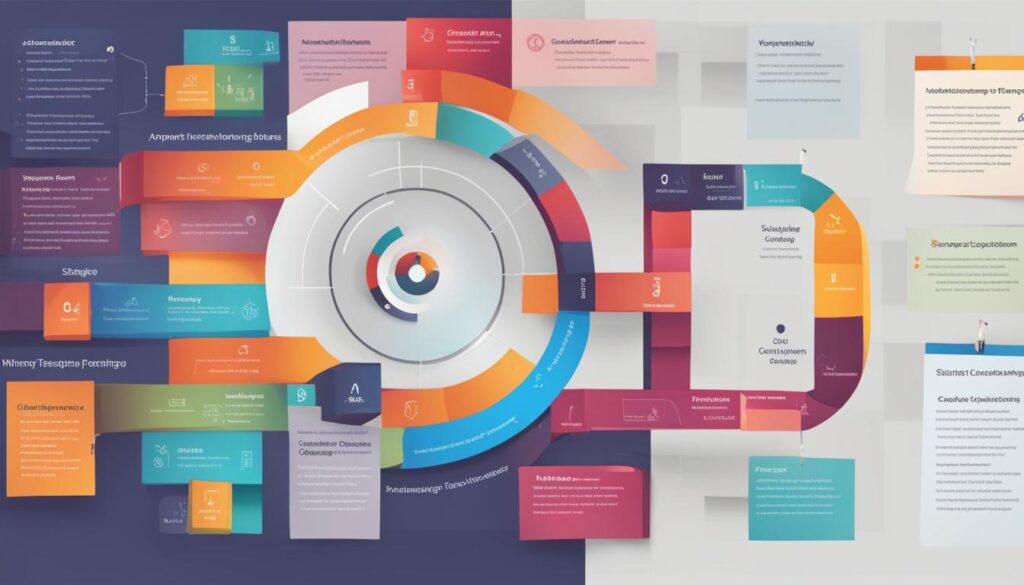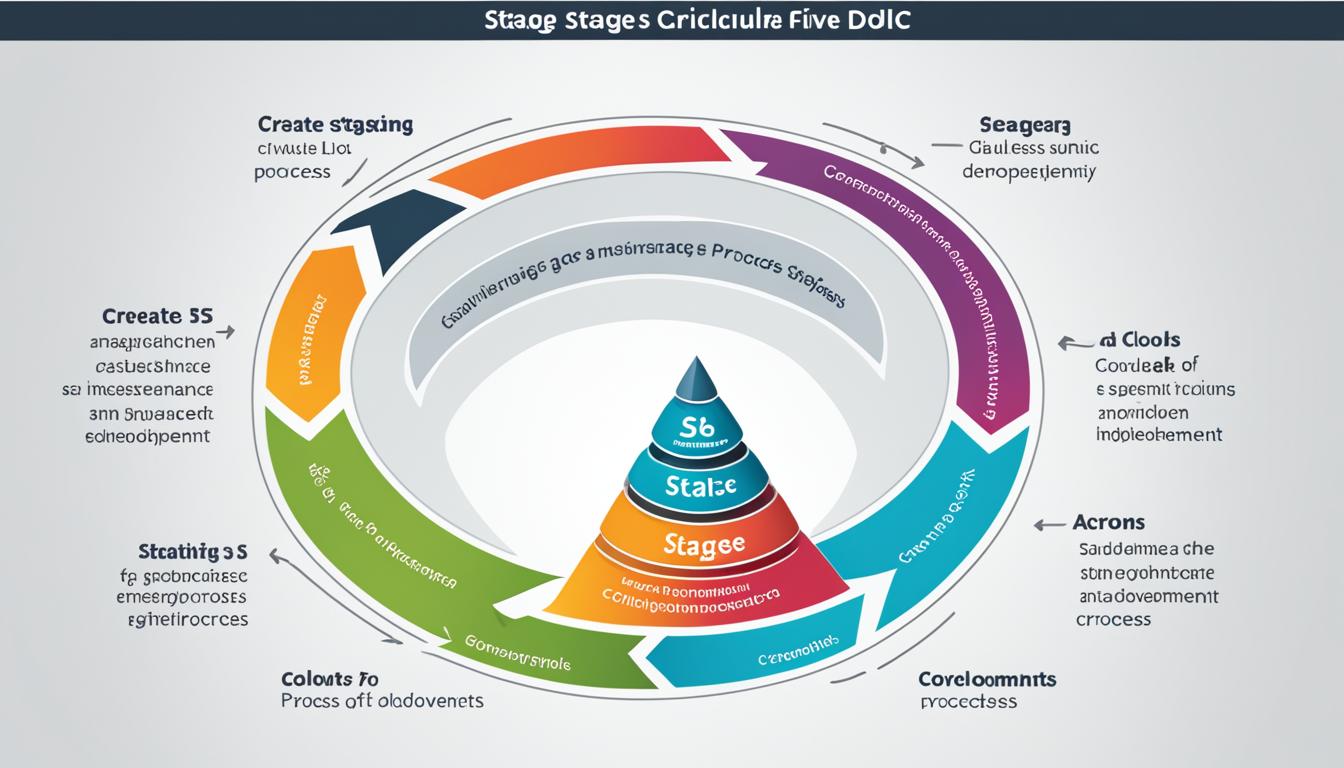Welcome to our comprehensive guide on specialized software testing training courses! Whether you are just starting out in your career or looking to enhance your skills, our programs are designed to equip you with the necessary knowledge and certifications required in the software testing field. Our courses encompass a range of subjects such as software engineering, programming, mobile development, web development, and problem-solving to help you excel in your software testing career.
Ready to take the next step? Browse our online training programs and find the best software testing institute near you to kickstart your journey!
Key Takeaways:
- Gain the necessary skills for a successful career in software testing
- Learn about software testing techniques and gain certifications in the field
- Take advantage of online training programs for convenience and flexibility
- Find software testing institutes near your location for in-person training and guidance
- Choose from a variety of software testing courses tailored to your interests and career goals
Skills You’ll Gain in Software Testing Training
When you enroll in software testing training, you’ll acquire a diverse set of skills that are essential for a successful career in quality assurance. These skills encompass various aspects such as software testing, software engineering, computer programming, Java programming, mobile development, and web development. However, your training will go beyond specific technical areas and equip you with additional proficiencies in problem solving, data analysis, and programming principles.
Software testing training ensures that you are well-equipped with the knowledge and expertise required to ensure high-quality software products. By mastering software testing techniques, you’ll be able to identify and rectify potential issues, bugs, and vulnerabilities within software systems. These skills are highly valuable in the software industry, enabling you to contribute to the development of robust and reliable applications.
Key Skills Acquired in Software Testing Training:
- Proficiency in software testing methodologies
- Expertise in software engineering principles
- Advanced knowledge of computer programming
- Deep understanding of Java programming
- Skills in mobile development
- Competence in web development
- Effective problem-solving abilities
- Analytical skills for data analysis
- Knowledge of programming principles for efficient software development
By honing these skills through software testing training, you’ll be well-prepared to excel in quality assurance roles, ensuring that software products are thoroughly tested and meet the highest standards of functionality and reliability.
Online Software Testing Training Programs
Looking to enhance your software testing skills? Online software testing training programs offer the perfect solution, providing convenience and flexibility to fit your schedule. Whether you’re a beginner or an experienced professional, these programs offer comprehensive training in various software testing methodologies and techniques.
With online software testing training, you have the freedom to learn at your own pace and access course materials anytime, anywhere. Whether you’re balancing work commitments or personal responsibilities, these programs allow you to pursue your career goals without compromising your other obligations.
Through these training programs, you will have access to expert instructors who will guide you through the software testing journey, sharing their industry knowledge and best practices. You’ll gain a deep understanding of the different testing techniques and tools used in the software industry, including manual testing, automated testing, and performance testing.

Benefits of Online Software Testing Training Programs:
- Flexibility: Learn at your own pace, fitting the training into your schedule.
- Accessibility: Access course materials anytime, anywhere, using any device.
- Comprehensive curriculum: Gain expertise in various software testing methodologies and techniques.
- Expert instructors: Learn from industry professionals with hands-on experience.
- Practical exercises: Apply your knowledge through real-world projects and simulations.
- Certifications: Earn recognized certifications to validate your skills and enhance your job prospects.
- Networking opportunities: Connect with fellow software testing professionals from around the world.
No matter where you are on your software testing journey, online training programs provide an excellent opportunity to further your career. Take the next step and enroll in an online software testing training program today!
Software Testing Training Near Me
Looking for software testing training institutes near your location? At our institutes, we provide in-person training and guidance from industry experts to help you gain practical experience in software testing. We understand that hands-on training is essential for your learning journey, and our institutes are equipped with resources to support your growth.
By attending classes in person, you will have the opportunity to interact with instructors and fellow students, fostering a collaborative learning environment. You can engage in discussions, ask questions, and receive immediate feedback, enhancing your understanding of software testing concepts and techniques.
Our experienced instructors bring real-world industry knowledge to the classroom, ensuring that you receive up-to-date insights and relevant examples. They will guide you through the training program, offering their expertise and answering any queries you may have. This personalized approach accelerates your learning and fosters a deeper understanding of software testing principles.
Furthermore, our institutes provide access to dedicated software testing labs, where you can practice your skills and apply theoretical concepts to real-world scenarios. These labs are equipped with the necessary tools and technologies used in industry-standard software testing processes.
By attending software testing training near you, you can immerse yourself in a focused learning environment and build a strong foundation in software testing. Gain practical experience, receive guidance from experts, and connect with fellow students who share your passion for software testing.
“Attending in-person training allowed me to network with professionals in the software testing industry and learn from their experiences. The hands-on exercises and interactive discussions enhanced my understanding and prepared me for real-world challenges.”
Find Your Nearest Software Testing Training Institute:
| Institute Name | Location | Contact |
|---|---|---|
| Software Testing Institute XYZ | City A | Phone: 123-456-7890 Email: info@xyzinstitute.com |
| Quality Assurance Training Center | City B | Phone: 987-654-3210 Email: trainingcenter@qa.com |
| Testing Excellence Academy | City C | Phone: 555-123-4567 Email: info@testingexcellence.com |
Discover the software testing training institute nearest to you and take the first step toward becoming a skilled software tester in a thriving industry.
Overview of Software Testing Courses
When it comes to enhancing your skills and advancing your career in software testing, there are a variety of courses available to suit your needs. Whether you’re a beginner or an experienced professional, these courses provide in-depth knowledge and hands-on training in various aspects of software testing. Here, we present an overview of some of the best software testing courses that can help you achieve your career goals.
Popular Software Testing Courses
1. Software Testing and Automation: This course focuses on the fundamentals of software testing, including test planning, test design, and test execution. It also covers automation tools and techniques to streamline the testing process and improve efficiency.
2. Foundations of Software Testing and Validation: This comprehensive course introduces you to the principles and techniques of software validation and verification. You’ll learn about test case design, defect management, and quality assurance practices.
3. Introduction to Software Testing: Ideal for beginners, this course provides a solid foundation in software testing principles and concepts. You’ll learn about different testing methodologies, such as black-box testing, white-box testing, and gray-box testing.
4. Software Testing for Developers: Designed specifically for developers, this course focuses on integrating software testing into the development process. You’ll learn how to write effective unit tests, conduct integration testing, and perform code reviews.
Course Topics
These software testing courses cover a wide range of topics to equip you with the necessary skills for a successful career. Some of the key areas covered include:
- Testing techniques and methodologies
- Test planning and strategy
- Test case design and execution
- Automation testing tools
- Performance testing and optimization
- Cybersecurity testing and vulnerability assessment
- Usability testing and user experience evaluation
By enrolling in these courses, you’ll gain practical knowledge and hands-on experience in these essential areas of software testing.

Benefits of AT*Learn Software Testing Training
When it comes to advancing your career in software testing, AT*Learn’s comprehensive training program provides numerous benefits. Our curriculum covers a wide range of topics, ensuring that you gain the knowledge and skills needed to excel in the field of software testing.
By enrolling in AT*Learn software testing training, you will:
- Acquire expertise in different test approaches, techniques, and methodologies
- Master the art of test automation to optimize efficiency and accuracy
- Develop the skills necessary for effective performance testing
- Learn how to conduct cybersecurity testing to ensure software security
- Gain insights into usability testing, enhancing user experience
Additionally, our training program includes bonus content on ERP testing, testing methodologies, and testing trends. These valuable resources broaden your understanding and keep you up-to-date with the latest industry practices.
| Benefits of AT*Learn Software Testing Training |
|---|
| Comprehensive curriculum covering various aspects of software testing |
| Expertise in test approaches, techniques, automation, performance testing, cybersecurity testing, and usability testing |
| Bonus content on ERP testing, testing methodologies, and testing trends |
With AT*Learn software testing training, you can elevate your skills, improve your software testing capabilities, and position yourself for success in the software testing industry.
Testimonials from AT*Learn Software Testing Training Users
Our users have shared their experiences and positive reviews of AT*Learn’s software testing training courses. They have acknowledged the effectiveness of the courses in their professional development and the valuable skills they have gained. Many users have achieved AT*SQA Software Testing Micro-Credentials and certifications, including the prestigious AT*SQA Testing Essentials Certification. The comprehensive content of our courses equips individuals with the knowledge and confidence to excel in software testing exams and succeed in their careers.
“AT*Learn’s software testing training courses have been instrumental in shaping my career as a software tester. The curriculum covers a wide range of topics, providing a holistic understanding of software testing principles and techniques. Thanks to the valuable knowledge gained from these courses, I was able to pass the AT*SQA Testing Essentials Certification exam with ease and land a rewarding job in the field.”
– Michelle Reynolds, Certified Software Tester
“I highly recommend AT*Learn’s software testing training courses to anyone looking to enhance their skills in software testing. The courses are well-structured and cover all aspects of software testing, including test automation, performance testing, and usability testing. The comprehensive content and practical exercises enabled me to gain in-depth knowledge and practical experience, which I successfully applied in my job as a QA Analyst.”
– Brian Thompson, QA Analyst
AT*SQA Software Testing Micro-Credentials and Certifications
AT*Learn’s software testing training courses have helped individuals earn prestigious certifications, such as the AT*SQA Testing Essentials Certification. These certifications validate the expertise and proficiency of software testers and enhance their career prospects. Here are some of the certifications earned by our users:
- AT*SQA Testing Essentials Certification
- AT*SQA Software Testing Micro-Credentials
By completing our courses and earning these certifications, individuals demonstrate their commitment to professional growth and become recognized leaders in the field of software testing.
Certification Achievements
| Course | Certification |
|---|---|
| Software Testing and Automation | AT*SQA Testing Essentials Certification |
| Foundations of Software Testing and Validation | AT*SQA Software Testing Micro-Credentials |
| Introduction to Software Testing | AT*SQA Software Testing Micro-Credentials |
| Software Testing for Developers | AT*SQA Software Testing Micro-Credentials |
AT*Learn’s software testing training courses have received rave reviews from individuals who have successfully completed them. The valuable knowledge and certifications gained through these courses have transformed their careers and opened up exciting opportunities in the software testing industry.
AT*Learn Software QA Courses & Tutorials
At AT*Learn, we offer an extensive selection of software QA courses and tutorials designed to equip individuals with the knowledge and skills needed to excel in software testing. Whether you’re a beginner looking to start a career in QA or a seasoned professional seeking to enhance your expertise, our courses cater to learners of diverse backgrounds and career paths.
Our software QA courses cover a wide range of topics, including:
- Test Automation: Learn how to automate software testing processes to improve efficiency and effectiveness.
- Performance Testing: Gain skills in assessing the performance and scalability of software applications.
- Cybersecurity Testing: Understand how to identify and mitigate security vulnerabilities in software systems.
- Usability Testing: Learn techniques to evaluate the user-friendliness and accessibility of software interfaces.
- Testing for IoT and Mobile: Explore the unique challenges and methodologies involved in testing IoT and mobile applications.
Our tutorials provide step-by-step guidance and practical examples to help you apply the concepts learned in our courses. Whether you prefer hands-on exercises or theoretical explanations, our tutorials cater to different learning preferences, ensuring a comprehensive learning experience.
Our courses and tutorials are created by industry professionals with years of experience in software testing. They are regularly updated to reflect the latest trends and best practices in the field, ensuring you receive relevant and up-to-date training.
With AT*Learn’s software QA courses, you’ll gain the skills and knowledge necessary to become a proficient software tester. Join us on this learning journey and take your software testing career to new heights.

“A well-structured curriculum ensures that learners acquire a solid foundation in software testing theory and practice.”
By following a comprehensive software testing training curriculum, learners can develop the skills necessary to excel in the fast-paced and demanding field of software testing. The curriculum combines programming knowledge, development concepts, and specific testing topics to provide a holistic learning experience. With a strong foundation in software testing, learners are well-prepared to contribute to the development and delivery of high-quality software products.
| Curriculum Highlights | Description |
|---|---|
| Java Programming Fundamentals | Introduction to Java programming language and core concepts |
| Agile Methodologies | Understanding the Agile development process and its impact on testing |
| Software Testing Fundamentals | Exploring different types of testing, test design techniques, and test management |
| Specification-based Testing | Mastering techniques like equivalence partitioning and boundary value analysis |
| Boundary Testing | Understanding how to test at the limits of software functionality |
| Code Coverage | Learning how to measure and improve test coverage at the code level |
| Software Testing Life Cycle | Applying a systematic approach to planning, designing, executing, and evaluating tests |
| Modern Development Environments | Exploring popular development tools and environments used in the industry |
| Debugging and Unit Testing | Gaining practical skills in identifying and fixing software defects |
Types of Software Testing Jobs
In the technology field, there are various types of software testing jobs available that offer exciting career opportunities. These roles play a critical role in ensuring the quality and functionality of software products. If you have a passion for technology and a keen eye for detail, consider pursuing a career in software testing. Let’s explore some of the common roles that involve software testing:
1. Software Developer
Software developers have the responsibility of designing, developing, testing, and maintaining software products. They collaborate with cross-functional teams to understand user requirements, write efficient code, and implement solutions. Though software developers primarily focus on coding, they are also involved in testing their code and ensuring its functionality.
2. Java Developer
Java developers specialize in programming with the Java language and framework. They create, test, and debug Java applications, ensuring the software meets the desired requirements and functions as intended. Strong understanding of Java programming principles and knowledge of testing methodologies is crucial in this role.
3. QA Analyst
QA analysts play a vital role in evaluating software quality and ensuring that it meets industry standards. They create testing systems, develop test plans, and execute tests to detect bugs or defects. QA analysts use various testing techniques and tools to assess the performance, reliability, and usability of software products.
4. QA Tester
QA testers focus on executing test cases, conducting quality assessments, and identifying software defects. They work closely with QA analysts and developers to report issues and provide feedback for improvements. QA testers are meticulous in their approach and have a keen eye for detail.
5. QA Engineer
QA engineers have a broader scope of responsibilities, combining software testing expertise with quality assurance strategies. They develop and implement quality standards, establish testing processes, and collaborate with cross-functional teams to drive continuous improvement in software quality. QA engineers ensure that the software development lifecycle aligns with industry best practices and standards.
These roles require technical knowledge, critical thinking skills, and the ability to document and report findings effectively. With the rapid advancement of technology, the demand for professionals in software testing continues to grow. Embrace the exciting opportunities in software testing jobs and embark on a rewarding career in the technology industry.

| Role | Responsibilities |
|---|---|
| Software Developer | Design, develop, test, and maintain software products |
| Java Developer | Create, test, and debug Java applications |
| QA Analyst | Create testing systems, develop test plans, and execute tests |
| QA Tester | Execute test cases, conduct quality assessments, and identify defects |
| QA Engineer | Develop and implement quality standards, establish testing processes |
Becoming a Software Tester Online
If you are interested in embarking on a career as a software tester and prefer the flexibility of online learning, there are several options available to you. While specific job requirements may vary, completing online coding boot camps and gaining relevant experience can significantly increase your chances of securing a software testing job. Additionally, having a strong foundation in programming tools and concepts, such as Java and SQL, is highly recommended. Familiarity with reporting and analytics can also prove beneficial for software testers.
Online Coding Boot Camps
Online coding boot camps are intensive training programs that offer comprehensive education in software development and testing. These boot camps typically cover fundamental programming languages and provide hands-on experience through coding projects and assignments. By enrolling in an online coding boot camp, you can develop the technical skills necessary to pursue a career in software testing.
Relevant Experience
Gaining hands-on experience in software testing is crucial for successfully entering the field. One way to gain this experience is by participating in open-source projects or contributing to software testing communities. This allows you to practice your testing skills, collaborate with experienced professionals, and build a strong portfolio that showcases your abilities.
Programming Knowledge
Having a strong foundation in programming tools and concepts is essential for software testing. Proficiency in programming languages such as Java, Python, or C++ is highly valuable, as it enables you to understand code structures and identify potential software issues. Additionally, familiarity with SQL and database management systems is advantageous when working with data-driven applications.
Reporting and Analytics
Software testers often need to analyze and report on the results of their testing efforts. Therefore, having a basic understanding of reporting tools and data analytics can prove beneficial. Familiarize yourself with tools such as Excel, Tableau, or Power BI to effectively analyze and present testing data to stakeholders.
Advantages of Online Software Testing Tutorials
When it comes to enhancing your software testing skills, online tutorials offer numerous advantages in terms of flexibility, convenience, and comprehensive learning options. Whether you are aspiring to explore new software testing topics or simply brushing up on your existing skills, online programs and courses have got you covered.
With online software testing tutorials, you have the freedom to learn at your own pace and fit your studies around your busy schedule. Whether you prefer to dive deep into automated software testing or delve into the intricacies of performance testing, online programs provide a flexible learning option that caters to your specific needs.
These tutorials cover a wide range of software testing aspects, including automated software testing, performance testing, usability testing, and more. They are designed to provide you with comprehensive knowledge and practical skills, enabling you to excel in software testing jobs.
By leveraging the power of online software testing tutorials, you can build your technical know-how, stay updated with the latest trends, and prepare yourself for a successful career in the dynamic field of software testing.
Whether you are a beginner seeking to kick-start your software testing journey or an experienced professional looking to expand your skill set, online tutorials offer a convenient and effective way to grow and excel in the QA testing domain.
Software Testing Training for Quality Assurance Teams
At our training institute, we understand the importance of equipping quality assurance (QA) teams with the necessary skills to enhance their testing capabilities. That’s why we offer comprehensive software testing training tailored specifically for QA teams.
By ensuring that everyone on the team receives the same training, we foster better communication, shared QA testing principles, and improved software quality.
Our training programs cover a wide range of topics catered to the needs of QA teams. Whether your team is focused on Agile methodologies, QA engineering, DevOps, performance testing, or usability testing, we have the right training program for you.
In our Agile team QA training, we emphasize the importance of collaborative testing in Agile development environments. With our QA engineer training, your team will learn about the fundamental principles and best practices of QA engineering. Our DevOps QA training equips QA teams with the knowledge and skills to integrate quality assurance into the DevOps process seamlessly.
Our performance testing QA training ensures that your team has a solid foundation in performance testing methodologies and tools, allowing them to identify bottlenecks and optimize software performance. With our usability testing QA training, your team will gain insights into enhancing user experience and making software more user-friendly.
By enrolling your QA team in our software testing training programs, you will enable them to build a strong foundation in software testing and enhance their skills and knowledge in QA practices. Empower your team to deliver high-quality software products.
Benefits of Software Testing Training for QA Teams:
- Improved communication within the QA team
- Shared QA testing principles and methodologies
- Enhanced software quality and reliability
- Better integration of QA processes into development workflows
- Increased efficiency in identifying and resolving software issues
Train your QA team with us, and witness the positive impact it has on your software development process. Quality assurance is the backbone of successful software products, and our training programs ensure that your team is equipped with the necessary skills and knowledge to excel.
Stay Updated with AT*SQA Newsletter
Subscribe to the free AT*SQA email newsletter to stay informed about the latest news and special offers in software testing. Our newsletter provides regular updates on software testing trends, new courses and certifications, and exclusive offers that you won’t want to miss.
By subscribing to the AT*SQA newsletter, you’ll receive timely updates directly to your inbox, ensuring that you stay ahead in the rapidly evolving field of software testing.
Don’t miss out on valuable insights and industry news. Subscribe to the AT*SQA newsletter today and join thousands of software testing professionals who rely on our newsletter to stay connected and informed.
Test Your Knowledge – DevOps QA
Ready to put your DevOps QA skills to the test? Take your expertise to the next level with our DevOps Part 1 and Part 2 courses. Designed to provide you with in-depth knowledge on DevOps principles, practices, and tools, these courses will equip you with valuable insights into DevOps QA.
DevOps Part 1 Course Highlights:
- Exploration of key DevOps concepts and methodologies
- Introduction to continuous integration and continuous delivery
- Hands-on experience with popular DevOps tools
- Real-world case studies and best practices
DevOps Part 2 Course Highlights:
- Advanced DevOps techniques and strategies
- Deep dive into continuous testing and deployment
- Practical application of DevOps in complex environments
- Effective collaboration and communication in DevOps teams
By completing these comprehensive courses, you will enhance your skills in DevOps QA and be well-equipped to drive successful DevOps implementations. Are you up for the challenge?
Testimonials
“The DevOps Part 1 and Part 2 courses provided me with a solid foundation in DevOps QA. The hands-on experience and practical knowledge gained from these courses were invaluable. I now feel confident in optimizing software development processes and ensuring seamless collaboration between teams.
– Jane Simmons, DevOps Engineer
Don’t miss this opportunity to take your DevOps QA expertise to the next level. Enroll in the DevOps Part 1 and Part 2 courses today and unlock the full potential of DevOps in your organization.
Conclusion
Software testing training is fundamental for individuals who aspire to excel in the field of quality assurance. By enrolling in software testing courses, you will acquire expertise in various testing techniques, tools, and methodologies. Whether you prefer online training or in-person classes, the diverse range of courses available will provide you with the necessary foundation to thrive in the software testing industry. To stay ahead, it is crucial to keep up with the latest trends and continuously enhance your skills.
During your software testing journey, you will gain invaluable knowledge in areas such as software engineering, programming, mobile development, web development, and problem-solving. Additionally, you will develop essential skills in software testing, including test automation, performance testing, and cybersecurity testing. These skills are paramount in ensuring the quality and reliability of software systems and products.
Investing in software testing training is a wise decision that will open up numerous career opportunities. By staying updated with the latest trends and continuously building your skills, you can advance further in your software testing career. Embrace the world of software testing and embark on a fulfilling professional journey where you can contribute to the creation of robust and high-quality software solutions.
FAQ
What topics are covered in software testing courses?
Software testing courses cover a range of topics including software engineering, programming, mobile development, web development, and problem solving. You will also learn about software testing techniques and gain certifications in the field.
Are there online software testing training programs available?
Yes, there are online training programs that offer comprehensive training in various software testing methodologies and techniques. These programs provide convenience and flexibility for individuals looking to enhance their skills.
How can I find a software testing training institute near me?
You can find software testing training institutes near your location by conducting a search online. These institutes offer in-person training and guidance from industry experts, allowing you to gain practical experience in software testing.
What are some popular software testing courses?
Some popular software testing courses include Software Testing and Automation, Foundations of Software Testing and Validation, Introduction to Software Testing, and Software Testing for Developers. These courses cover a wide range of topics such as testing techniques, automation, performance testing, and cybersecurity testing.
What does AT*Learn software testing training offer?
AT*Learn software testing training offers a comprehensive curriculum that covers various aspects of software testing. It includes knowledge and skills in areas such as test approaches, testing techniques, test automation, performance testing, cybersecurity testing, and usability testing.
What do users say about AT*Learn software testing training?
Users of AT*Learn software testing training have provided positive feedback on the effectiveness of the courses. They have praised the comprehensive content and their ability to prepare individuals for software testing exams.
What type of software testing jobs are available?
There are several types of software testing jobs available, including software developer, Java developer, QA analyst, QA tester, and QA engineer. These roles require technical knowledge and the ability to document and report findings.
How can I become a software tester online?
To become a software tester online, you can complete online coding boot camps and gain relevant experience. It is also recommended to have a strong foundation in programming tools and concepts, such as Java and SQL.
What are the advantages of online software testing tutorials?
Online software testing tutorials provide flexibility and convenience for individuals looking to enhance their skills. These tutorials cover various aspects of software testing and allow you to learn at your own pace.
Why is software testing training important for quality assurance teams?
Software testing training is important for quality assurance teams as it improves their testing knowledge and skills. It leads to better communication, shared QA testing principles, and improved software quality.
How can I stay updated with the latest software testing news and offers?
You can stay updated by subscribing to the free AT*SQA email newsletter. The newsletter provides updates on software testing trends, new courses and certifications, and exclusive offers.
How can I test my knowledge in DevOps QA?
You can test your knowledge on DevOps QA with the DevOps Part 1 and Part 2 courses. These courses provide in-depth knowledge on DevOps principles, practices, and tools.
Why is software testing training important for a successful career in quality assurance?
Software testing training is essential for developing the skills and knowledge necessary for a successful career in quality assurance. It provides expertise in various testing techniques, tools, and methodologies.









